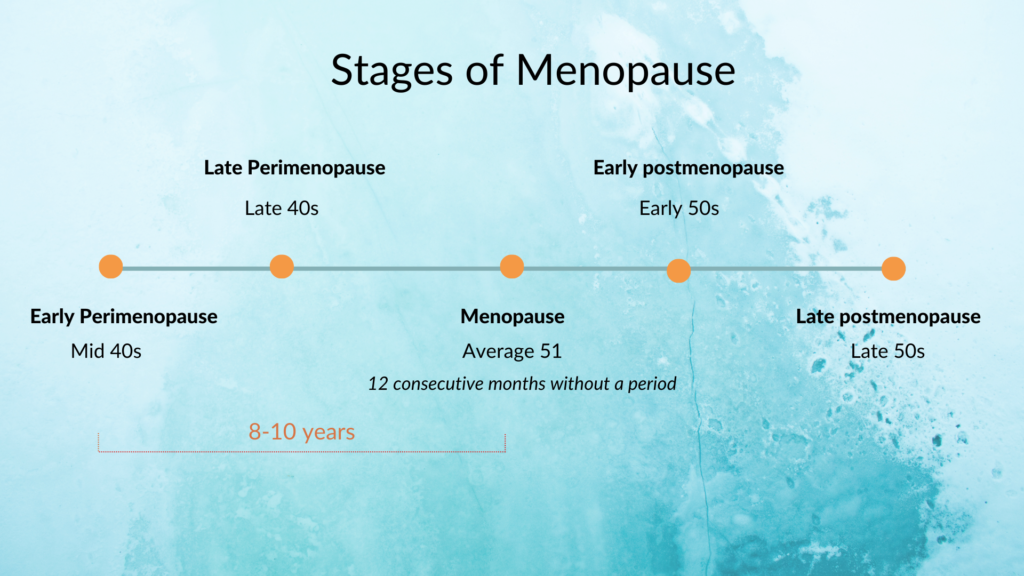PERIMENOPAUSE: What’s happening to my body?
Understanding the signs and symptoms of perimenopause and the effect of hormonal changes on your body can help you to take control and support your health during your menopause journey.

What no one told us about menopause…
You probably didn’t have the sit-down menopause ‘talk’ by your mom or doctor before you started to experience the ‘fun’ rollercoaster ride of it all. If you’re just starting your menopause journey and feeling a little lost or overwhelmed, this article will help you to understand what the heck is going on in your body right now.
It doesn’t mean the symptoms will magically disappear, but understanding what’s happening can help you feel more in control and help you to take targeted steps to get the advice, nutrition, medication, fitness plan and/or supplements to support your health and make your menopause journey a little less bumpy.
The Stages of Menopause
There are actually 3 stages of menopause:
- Perimenopause
- Menopause
- Post-menopause
All three stages have different physical and hormonal differences. We usually use the word menopause to cover all three phases, but let’s dive a little deeper into what’s going on in the first phase – perimenopause – which has the most significant biochemical, physical and emotional changes.

Perimenopause: Your body and hormone changes
During perimenopause, which is the transitional phase leading up to menopause, your body undergoes various hormonal changes and physiological shifts. It usually starts around mid-to-late forties on average, and can last from 2-10 years. This is when many of the ‘menopause symptoms’ occur from hot flashes and night sweats to mood swings and irregular periods.
Here are some key changes that occur during perimenopause:
1. Fluctuating hormone levels: Perimenopause Fluctuating hormone levels: Permenopause is when your body straps you into a rollercoaster ride of hormone fluctuations, particularly oestrogen and progesterone hormones. This can feel like a bumpy ride for some women, as these hormonal changes can lead to erratic periods, joint pain, and clammy hot flashes to name a few side-effects.

3. Vasomotor symptoms: Hot flashes and night sweats are common symptoms experienced during perimenopause. In fact, up to 85% of women will suffer hot flashes or night sweats during perimenopause, so you’re certainly not alone. These often come on suddenly, with a feeling of intense heat, often resulting in sweating and flushed cheeks. Frustratingly it can be disruptive to your sleep, embarrassing in public and really uncomfortable! Read this for tips on how to manage your hot flashes.
4. Mood swings and anxiety: No, you’re not a crazy lady! Hormonal fluctuations during perimenopause can affect your mood, leading to mood swings, irritability, anxiety, or depression. This can wreak havoc with your family and friends. It’s important to get support from your healthcare provider if you’re feeling overwhelmed, as there are many medical, holistic and nutritional remedies that can help. A quick win that’s within your control is to make some changes to your diet to help reduce your stress levels – here are some tips to help you manage your stress through your food choices.

5. Vaginal and sexual changes: Decreased oestrogen levels can result in vaginal dryness, reduced lubrication, and thinning of the vaginal walls (vaginal atrophy). These changes can cause pain during sex and may decrease your sex drive. Speak to your doctor or a sex therapist if you’re having vaginal issues during perimenopause, as there are many creams and lubricants on the market that can help ease any pain during sex and restore your sex drive.
6. Changes in bone health: Oestrogen helps maintain bone density, and since it starts to decline during perimenopause, this can increase your risk of osteoporosis (weaker bones) and risk of fractures. Make sure you’re following bone-healthy habits, including getting enough calcium and vitamin D through your diet or a supplement, and regular weight-bearing exercises.

7. Metabolic changes: During perimenopause, your metabolism may slow down, leading to weight gain, especially around the abdominal area. Ugh! On top of that, hormone changes during perimenopause can also affect insulin sensitivity, which may increase the risk of developing insulin resistance and type 2 diabetes. As frustrating is that is, there are ways to combat weight gain, belly fat and maintain a healthy blood sugar level through healthy eating.
No two menopause journeys are alike
It’s important to remember that your experience during perimenopause is unique and may be quite different to the women around you. No two women are the same, so it’s important not to compare with or judge other women.
Some women may have few symptoms or mild changes, while others may experience a truckload of symptoms. Unfortunately, there is no simple and definitive test to determine perimenopause, so its important to work with a trained healthcare provider to do some investigative work – keeping track of your symptoms and ruling out any other diseases with similar symptoms can help you and your doctor determine if you are in perimenopause.
You are not alone. There have been major advancements in medical and nutritional support for perimenopausal women and it’s important to get professional help to take control of your health and improve your quality of life during this phase of womanhood.
If you’d like to consult with me directly, simply get in touch at [email protected]